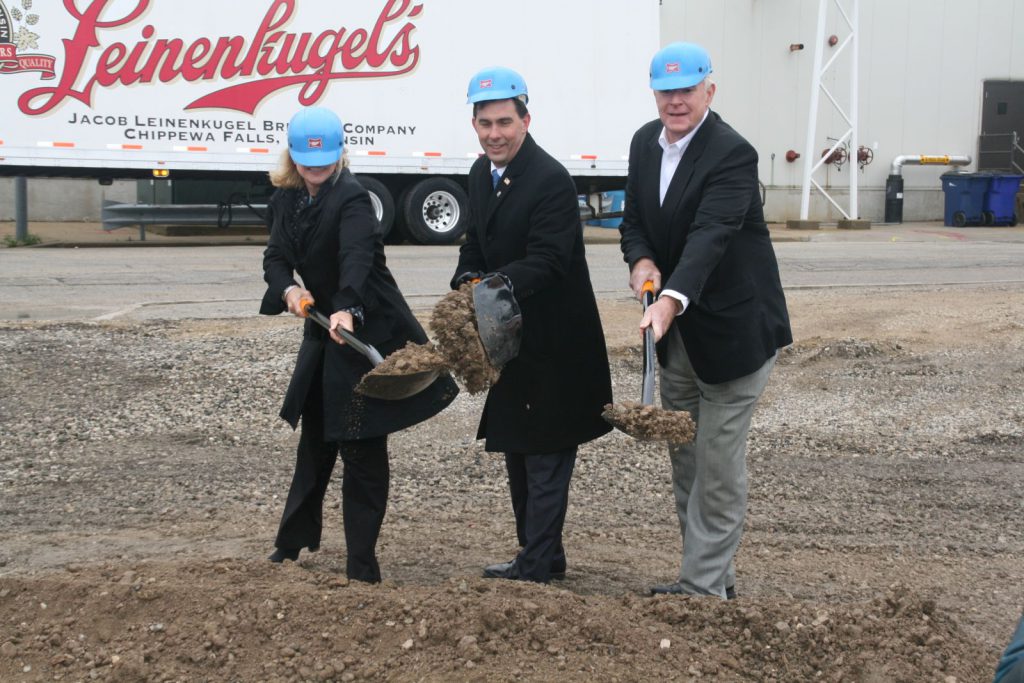5 Ways to Help Workers
Walker says he wants to remove barriers to work. Here’s how to do it.

Kelly Grebe, Governor Scott Walker, Mayor Tom Barrett at the 10th Street Brewery expansion groundbreaking. Photo by Jeramey Jannene.
Governor Scott Walker claims he wants to expand the Wisconsin workforce by removing barriers to work, but his proposals make damaging changes to services that help families meet basic needs.
Increasing the Wisconsin workforce can, and should, be done in ways that support families who are struggling to overcome barriers to work—such as lack of transportation and child care—rather than ways that create new barriers for families who are struggling to get and maintain jobs. State lawmakers could more effectively boost the Wisconsin economy by tackling the significant barriers to work that many low-income families face. This can be done without making damaging changes to public assistance programs that help Wisconsinites be work-ready. Here are five steps state policymakers could take to expand the Wisconsin workforce that are more effective than Governor Walker’s proposals:
- Stop suspending driver’s licenses for not paying fines that are unrelated to driving.
Not being allowed to drive is a major hurdle to getting and keeping a job, and the state should be working to make sure potential workers who haven’t engaged in illegal or unsafe driving can keep their driver’s licenses. Instead, Wisconsin courts suspend hundreds of thousands of licenses each year for reasons unrelated to driving, primarily nonpayment of fines. Of the nearly 418,000 suspensions in our state in 2013, 60%—or about 250,000 suspensions—were for failing to pay a debt, such as a municipal citation or a ticket for a low-level violation like having a burnt-out headlight. Each of those suspensions represents a potentially insurmountable hurdle for workers who need a valid driver’s license to get to work.
- Expand eligibility and credit amounts for the Earned Income Tax Credit.
The EITC increases the financial incentive to work for people who work at low and moderate wages, bringing more people into the workforce and increasing the number of hours that they work. But Wisconsin only offers the credit to workers with children, meaning that workers without dependent children have a harder time making work pay. Wisconsin is an outlier in that we are the only state that has an EITC that excludes workers without dependent children. Fixing that omission would provide a powerful incentive for more potential workers to enter the labor force. Increasing credit amounts for workers who are already eligible would also increase the incentive to work.
- Improve access to child care.
Parents can’t go to work if they don’t have child care, but many jobs don’t pay enough to cover the cost of child care. The structure of Wisconsin’s child care assistance program presents an obstacle to these workers who are also seeking child care: state support for child care subsidies has dropped by $130 million over the last decade. With reimbursement rates frozen for most of that time period, many child care providers have dropped out of the assistance program, making it more difficult for families to find child care. To make sure that parents can get the child care they need in order to go to work, Wisconsin needs to make long-overdue investments in its child care assistance program.
- Make sure child care assistance fits workers’ schedules.
Many workers who hold low-wage jobs work erratic hours or are not assigned a work schedule far in advance. The structure of Wisconsin’s child care assistance program presents obstacles for these workers who are also seeking child care: recently-adopted guidelines for child care assistance require that parents be prepared to provide up to four weeks of their schedule ahead of time. According to COWS:“Given the erratic scheduling practices used by many low-wage employers, this requirement makes child care subsidies nearly impossible to secure. Uncertain hours, which are unavailable for some workers, keep many low-wage workers from being eligible. They are committed to work, but their employer designs work in a way that they cannot secure these supports. This means that it is essentially the structure of the job that is keeping an otherwise eligible working family from desperately needed support.”
- Raise the minimum wage.
Wisconsin’s minimum wage has been stuck at $7.25 since 2009, and has lost about 15% of its purchasing power since then. Meanwhile, 18 states and 20 cities and counties raised their minimum wage this month alone, many of them to rates ranging from $12 to $15 an hour.The large number and variety of states with increases in the minimum wage this month shows that this issue cuts across partisan lines. Several states that have both governor’s seats and legislatures controlled by Republicans upped their minimum wage at the beginning of this year, including:
- Ohio, where the minimum wage increased to $8.30;
- South Dakota, where the minimum wage increased to $8.85; and
- Arizona, where the minimum increased to $10.50 as part of a process of increasing the minimum to $12.00 by 2020.
Bringing significantly more people into the workforce will be difficult, given that Wisconsin already has one of the highest labor force participation rates in the country. Only four states—North Dakota, South Dakota, Utah, and Minnesota—had a higher share of their residents in the workforce than Wisconsin as of December 2017.
Despite Wisconsin’s high labor force participation rate, it is still possible to pull more people into the workforce by making sure that work pays and by removing obstacles to work. Governor Walker’s proposals would do little to achieve these objectives and instead would make basic assistance more difficult to access.






















How about removing barriers to those who do not drive, by choice or circumstance….like a better bus system in Milwaukee area….buses, that will take workers to areas outside the routes that Milwaukee’s bus system uses…like New Berlin, Waukesha, Port Washington, etc. so that employees can get to work and still have a “life”.
Wisconsin is losing the middle class the faster then any state in the union and the new jobs in Wisconsin are service jobs with low pay. I now live where access to Internet is not available and starting a new business in this area of the state is not feasible and to have some type of service is dial up like my neighbors have. I live in the Oshkosh area not some undiscovered area of the Pacific Ocean. When Walker turned down our federal tax dollars in 2011 to hook the rest of state with high speed Internet I new Wisconsin was not going to be part of the future like Minnesota and other states that don’t blame and kick the poor around again and again to try to get reelected.
Here is one way to help workers.
Dump Walker in November 2018!
Dump all republicans in November 2018!
@Will, exactly, same here. I actually did have better internet on my boat in the Pacific Ocean than I do now at my house in Career Politician Scott Walker’s Wississippi! I had to move my business to Minnesota. You can’t trade coffee futures on DSL Walker! That’s not “pro-business” Walker! That’s not “pro-business” republicans!